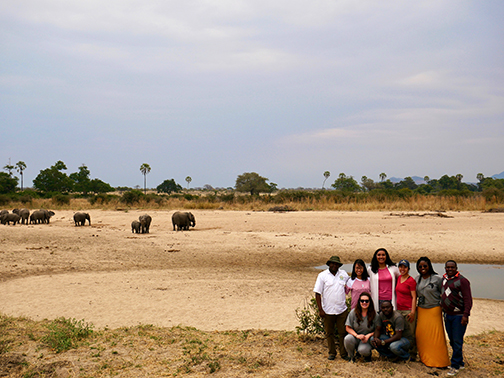Megan Ouyang
Megan Ouyang - Tanzania: A Summer of Changing Perspective
I discovered the Rx One Health course after a brief presentation in class by Dr. Pat Conrad, and I knew this would be an amazing opportunity to gain valuable experience in the field. I learned my classmate, Allison Coyle, was applying as well. Together, we decided to pursue an international research project in conjunction with the course. After some brainstorming sessions with faculty, including Dr. Woutrina Smith, our mentor and one of the Rx One Health course leaders, we chose to investigate how climate change will affect lion populations in Ruaha National Park, Tanzania.
My first two weeks in Tanzania were dedicated to the research portion of my experience. Together with Allison, I conducted a two-part project with support from the Global Feline Health Research Fellowship and International Externship funding. The overall goal was to use a One Health transdisciplinary approach to investigate the potential impacts of climate change on large felids in the Ruaha National Park landscape of Tanzania. The first part of the project involved a literature review on climate change and the lions of Africa. Our findings indicate that the availability of critical resources, such as land and water, will change in the future. These changes will affect both people and animals, especially affecting the dynamics of human-wildlife conflict.
The second part involved conducting fecal genetics testing on the lions of Ruaha National Park. I spent many hours bouncing around the back of a truck while in search of lion fecal samples. While the days were long and hot, it was also thrilling to be in the bush, surrounded by all manners of African wildlife. Each day of collecting samples was like being on safari! It was also a great opportunity to get to know Dr. Goodluck Paul, a field veterinarian with the Health and Livelihood Improvement Project (HALI), which is a collaborative program between UC Davis and Sokoine University of Agriculture (SUA). Dr. Goodluck was a wealth of knowledge about Tanzania, including the local Masaai tribes, zoonotic disease, and community engagement. I also did my best to learn the names of all the animals in Swahili from him, which was an entertaining way to engage myself in learning a new language. While we are still awaiting results for the fecal genetics portion, I learned so much from the process alone that the experience was worth it.
I learned a lot about research methodologies, but even more valuable was the relationships I came away with at the end of the summer. I met wonderful collaborators, mentors, and peers, both domestically and abroad. At UC Davis, Allison and I prepared in the lab of Dr. Benjamin Sacks, learning about fecal genetics. We also interacted with several members of the One Health Institute, in the weeks leading up to summer and during the Rx One Health course. Professor Rudovick Kazwala was instrumental in preparing for our arrival at SUA, from putting us in touch with great mentors, to making sure we had all the resources we needed. During the research portion at SUA, I found a welcoming mentor in Dr. George Makengi, who graciously let us use his lab to process our fecal samples. I also had the opportunity to work closely with HALI team members in the SUA container lab. It was a great experience in being adaptable, thinking outside the box, and working with diverse colleagues.
After 2 weeks at SUA, I had to say goodbye to the newfound friends there and embark on the next portion of my trip: Rx One Health. There were 21 students, from a variety of backgrounds and professions. The course was a whirlwind of experiences throughout Tanzania, exposing us to opportunities as unique as seeing hatching baby turtles on Juani Island, surveying giraffe skin disease in Ruaha National Park, and conducting poultry farm site visits in the Iringa municipality. Importantly, it was a chance to learn about cultural sensitivity, through interacting with the language, people, and government of Tanzania. During the 4 weeks of the course, I saw One Health approaches at work through collaborations addressing challenges of human, animal, and environmental health. We finished the course with a capstone project, in which we created research proposals for potential future HALI projects. This was the perfect chance to put my knowledge into practice. Not only did I gain valuable skills for my future career, but I came away with friendships and colleagues I look forward to working with.
I truly treasure participating in this international research experience in conjunction with Rx One Health. I was able to practice and gain new skills that I would not have been able to through the classroom school curriculum. I am so grateful to all those who helped me along the way, with their knowledge, encouragement, and expertise. It especially would not have been possible without the Global Programs office, and their generous support. My time in Tanzania was an invaluable experience that has allowed me to become a better informed, more conscientious, and well-rounded veterinarian and individual.

